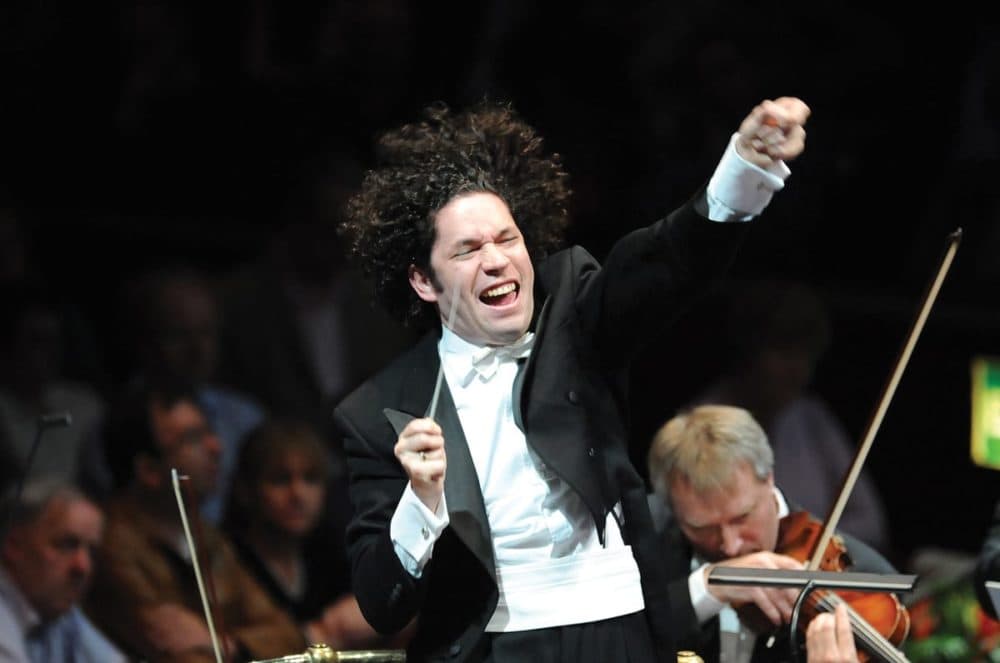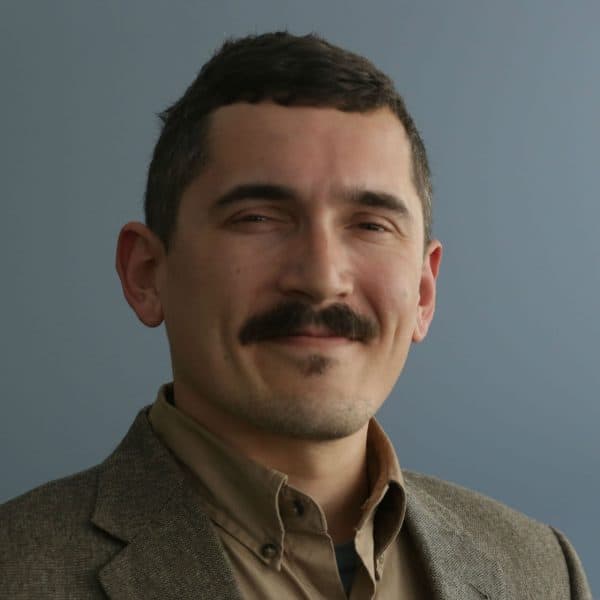Advertisement
At BSO, Gustavo Dudamel Brings Message Of Inter-American Unity
Resume
Update at 5:10 p.m.: The Boston Symphony Orchestra has announced that Dudamel has withdrawn from this week's BSO concerts, "due to complications from a hand and arm injury sustained from a fall he took last December."
Original story:
With his trademark curly mane and a conductor's baton pinched between his fingers, Gustavo Dudamel navigates the Boston Symphony Orchestra through Igor Stravinsky’s "The Rite of Spring," when suddenly he stops the rehearsal to discuss one of the measures just played: “I’m sure that we want, and Stravinsky in his grave wants … zham-ba-tee-ba-tee-ZHAM! — this pauses, then immediately goes with the next thing — ta-ta-ta-ta-ta-um-ta-OOM! … That gives us the impulse to keep moving — and then we die."
The orchestra picks up from the beginning of the measure — this time to the maestro’s liking — before moving on to the next.
Since his first days at the helm of the Los Angeles Philharmonic at age 28, Dudamel has been acclaimed as the "scarily talented young conductor ... thrust into the position of acting as music's savior."
A decade later, he is in Massachusetts for a six-show series with the BSO — an ensemble, and a city, with deep ties to his musical upbringing.
“We are here with one of the most emblematic orchestras in the world,” Dudamel told WBUR after the rehearsal at Symphony Hall. “And having the chance to do two completely different [musical] programs. … I love to build these programs where you don’t see any frontiers, you know, nothing is separating us.”
Born in the city of Barquisimeto, Dudamel is a product of the internationally recognized El Sistema music program. El Sistema was founded in 1975 to provide classical music training to children of all backgrounds across Venezuela, now with some 400,000 alumni in the country, and spin-offs around the world.
“Since many years ago, teachers from [Boston] were coming to Venezuela,” Dudamel recalled. “It was a relation with El Sistema and the New England Conservatory … and I had a chance to see them.”
In the early 2000s, Dudamel stayed in Boston for a month, as conductor of the Youth Orchestra of the Americas, before returning as a guest conductor of the BSO, as well as performances with the Simon Bolivar Symphony Orchestra.
“And here [in the Boston area] it’s huge El Sistema," Dudamel said, "all of these groups that have created these programs inspired by El Sistema.”
El Sistema at the Conservatory Lab Charter School in Dorchester is one example; another is the El Sistema after-school program in the Somerville Public Schools.
As for the series now underway at Symphony Hall, the works begin in Europe during the first shows, then return to the Americas in the last shows.
Tuesday night’s program will consist of Robert Schumann’s "Symphony No. 1," and Stravinsky’s "The Rite of Spring." Dudamel’s final two shows, Thursday and Friday at 8 p.m., will include "Piano Concerto No. 1" by the Argentine Alberto Ginastera, "Cantata Criolla" by the late Venezuelan composer Antonio Estévez and "Hipnosis Mariposa," composed by the contemporary Venezuelan Paul Desenne. (Friday’s performance will not include Desenne’s work.)
Dudamel said the Latin American selections will be played for the first time by the BSO. And he says the performance of those pieces are his way to show gratitude to the country he now calls home.
"When you are in a place where you are not from, but [which has] embraced you as part of, the best way to pay homage is to show your identity and your soul," he said.
Dudamel, now 38, was honored earlier this year with a star on the Hollywood Walk of Fame — the first Venezuelan artist to receive the honor, and a hallmark moment cementing his place in American pop culture.
As a South American living in the U.S., Dudamel says he wants his music to connect the people of the Americas, especially given the upheaval unfolding in his native land, which remains in the throes of an economic crisis as well as a battle for the reins of power.
“I’m sure what we believe, Venezuelans, people from the United States, people from Mexico, people from Argentina — we believe in one America,” he said.
"And I believe, I believe deeply, that when [Venezuela gets] out of this horrible, this terrible situation, I'm sure the culture … will play a very important role in the reconstruction of the new country.”
Correction: An earlier version misidentified the Stravinsky composition the BSO was rehearsing. We regret the error.
This article was originally published on April 08, 2019.
This segment aired on April 8, 2019.
